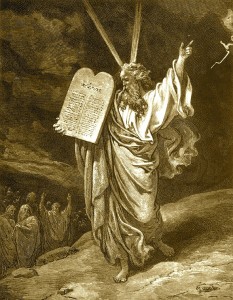Similarly, Christianity defines the profit motive as a matter of vocation. In keeping with their basic sociologies, capitalists emphasize enlightened selfishness and socialists a revolutionary selflessness but neither accurately expresses the true state of human nature nor do they provide sufficient motivation for working hard to earn wages, support one’s family and make sacrifices for others. Again, this is something that can flow only from the belief in a Supreme Creator.
Since God created each of us we have inherent value (Psa 139:13) and work toward a goal that will stand firm when this finite, physical world returns back to the dust (Mat 6:19-21). Because of this, Christians neither work to please themselves, nor those around them but rather “work heartily,” “with sincerity of heart, fearing the Lord . . . knowing that from the Lord you shall receive the inheritance as your reward” (Col 3:22-25 ESV; see Eph 6:5-8). Only a reward such as this can turn a thief into a worker (Eph 4:28), a freeloader into a contributor (2Th 3:10) and a father into a provider (1Ti 6:10). After all, if there is no God, one might as well “relax, eat, drink” and “be merry” (Luke 12:19).
Furthermore, contentment is the goal of Christian economics, not wealth. To make this point quite clear, Paul wrote to Timothy that as soon as wealth becomes the goal one can no longer glorify God in what he does, saying that “those who desire to be rich fall into temptation, into a snare, into many senseless and harmful desires that plunge people into ruin and destruction” (1Ti 6:9). Instead, our goal should be “godliness with contentment” (1Ti 6:6) knowing both “how to be brought low” and “how to abound” that in “any and every circumstance” we might reflect the character of Christ, who strengthens us (Php 4:12-13). Contentment is impossible, however, if we refuse to take the time to properly plan financially for the future (Luke 14:28-30), if we spend well outside of our means (Pro 22:7) and if we save nothing for the rainy days that are sure to come (Pro 21:20).
Finally, then, as Christians we should take the initiative to ensure a brighter future for those around us through the outworking of charity. We do this by not unduly increasing the debts of others or ourselves (Pro 6:1-5), but by forgiving the debts of those who are debtors to us (Mat 6:12) and giving freely to those who have need. The early church did this often in times of great need:
And all who believed were together and had all things in common. And they were selling their possessions and belongings and distributing the proceeds to all, as any had need. And day by day, attending the temple together and breaking bread in their homes, they received their food with glad and generous hearts, praising God and having favor with all the people. And the Lord added to their number day by day those who were being saved. . . .
Now the full number of those who believed were of one heart and soul, and no one said that any of the things that belonged to him was his own, but they had everything in common. . . . There was not a needy person among them, for as many as were owners of lands or houses sold them and brought the proceeds of what was sold and laid it at the apostles’ feet, and it was distributed to each as any had need. (Acts 2:44-47; 4:32-35)
This is not socialism (as evidenced that there were still private homes in which to meet); this is Christians seizing the opportunity to “do good to everyone, and especially to those who are of the household of faith” (Gal 6:10).
Christian economics, then, is neither capitalism nor socialism. Instead, it transcends manmade theories through its reliance on Yahweh as our Creator and God. Upon this sure foundation he builds the walls of stewardship, vocation, contentment and charity, in which works we remain active so that on that Day we might find ourselves in his good favor. For, “Blessed is that servant whom his master will find so doing when he comes. Truly, I say to you, he will set him over all his possessions” (Luke 12:43-44).
Cross-posted from In His Image.





